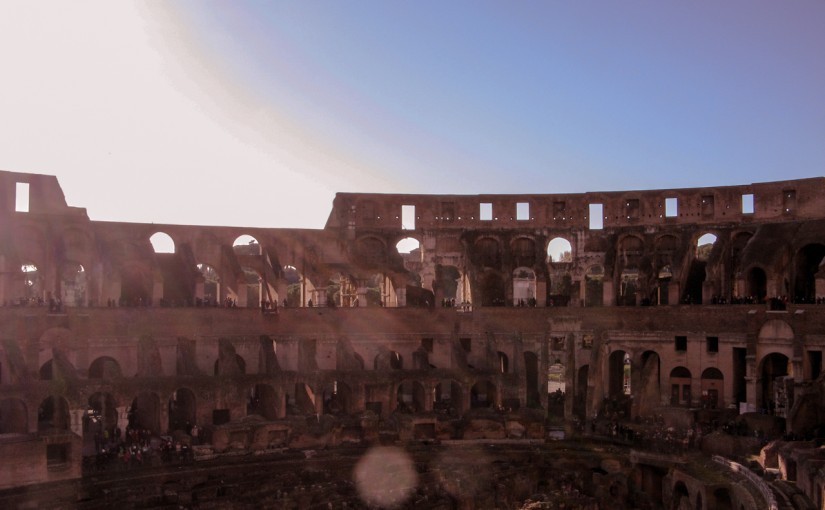Author: Wendong Wang
Rome: Vatican Museum
Rome – Street
Rome – Colosseum
Rome – Roman Forum and Palatino Hill
Rome – St. Peter’s Basilica in the morning
Rome – St. Peter’s Basilica at Night
Gera – Christmas at Stefan’s
Random Thought on the Road: Sports
On Athletic High
Gladiators were trained professional. They had training schools, and there were huge amount of money and effort involved in gladiatorial games. In a sense, they are like modern day soccer (or football, correctly called) players. Both play in big arenas; both have limited time period for professional lives (either being slain or retired); and both perform for entertainment. The key difference, I think, is that the former is more cruel and involves blood spilling and finishing your opponent for good, whereas the latter is comparatively more civilized and sustainable way of competing. But perhaps I am judging the ancient activity with the wrong morality; perhaps in Roman times, slaying in Colosseum is a perfect sport that affords the highest level of entertainment. If the core of human nature is forged over million years of evolution, 2000 years of modern history is too brief to make any significant change to that somewhat raw and savage core, and maybe some part of the human nature has and will always have something to do with blood. And yet if modern day football have indeed some roots in the ancient gladiator games, its existence and popularity tell us that the expression of the same core human nature can be disciplined and can grow into more refined forms, while still keeping adrenaline flowing.
On Sportsmanship
But sports are much more than just adrenaline, or athletic high. There are discipline in training, team work in playing, and fairness in competing. It is often said that one can tell a person’s character directly from the way he plays soccer, such as whether he plays for himself or for the team, whether he plays for the sole purpose of winning or for the love of the game, and whether he understands the subtle but crucial difference between sportsmanship and gamesmanship.
On Match Fitness
Often hear that in order to recover from injury or long vacation, a soccer player need to train for an extended period of time until he reaches match fitness before he can play in competitive games. The idea of match fitness goes beyond just being fit or without illness. It perhaps involves a certain level of fatigue from disciplined training that builds endurance. If match fitness represents a higher form of physical fitness, there could be analogous ideas in the intellectual, emotional, and spiritual domains. The sharpness of the brain and the strength of the heart may also need constant training in order to achieve higher and higher levels of fitness.
On Sports as An Art Form
A while ago, I read the following quote in the Guardian about the 2014 Bayern Munich team:
“It’s a football that the Bundesliga has never experienced in 50 years; so delicate and precise, so playful and determined, so sophisticated and improved, so inspiring and exciting. No one has come this close to art with football in this land as Pep Guardiola.”
Strategies, tactics, and game plans aside, once a team has the physical skills and mental strength, what comes out of every game at the highest level of competition can be beauty and elegance. This blending of sport and art blurs the boundary of the savage and the refined and is perhaps the finest expression of human nature.
Re-scripting
Benjamin Franklin did it in his twenties. Stephen Covey advised it. I think it is a good idea, so here it is: a list of habits I wish to keep and develop, or wish to learn. Some require “constant vigilance… to guard against the unremitting attraction of ancient habits… (and) force of perpetual temptation” (to quote Benjamin Franklin). Some require me to unlearn what I have learned (to rephrase Yoda, the Jedi master).
With self
Proactivity: “Between stimulus and response there is a space. In that space lies our freedom and power to choose that response. In those choices lie our growth and happiness.” (Viktor Frankl) Visualize that space, and practice looking at yourself from a distance, high and above.
Discipline: Discipline the body and the mind. “The body is a good servant but a bad master.” Rest frequently. Strive for full alertness of senses and tranquillity of the mind at all times. Watch for your temper.
Patience and Persistence: Be patient and persistent in building skills and refining your work. “Rome is not built in one day”, but it has to be built.
With others
Win-win or no deal: Remove or keep in check win-lose or lose-win mentalities, both of which are rooted in the habit of comparing and competing, and neither of which will last long in any healthy long-term relationships. When win-win is not possible, seek no deal.
Trustworthiness: Being trusted is more important than being liked. Trustworthiness necessitates character and competence.
Silence: “Speak not but what benefit others or yourself; avoid trifling conversations”. (Benjamin Franklin) Get rid of the habit of being argumentative, and avoid the tendency to show off. Persuasion is seldom achieved by reason alone, and pride is as troublesome as complacency.
Profession
Truth: Theory, however elegant, has to be congruent with facts. Truth necessitates integrity and honesty.
Progress: My research should always aim to advance human knowledge and/or to make something useful.
Refinement: A work of science is a work of art, and vice versa.
With the world
Well-rounded: Develop an appreciation for arts, literature, music, language, and other creative endeavours of all human cultures.
Informed: Keep up-to-date on important events around the world, but filter out the noise.
Concerned: No need to suffer unnecessarily, but be aware of all sufferings.
PS. Written mostly on trains
PPS. Some thoughts are better completed on the road, at a distance from daily routines.




























































































































































